Elliot S! Maggin's Miracle Monday vs Alan Moore's Whatever Happened to the Man of Tomorrow? - (The Miracles and Tragedies of Pre-Crisis Bronze Age Superman)
This is a post I've been meaning to make for over a year now. This will be divided into 5 segments after this brief introduction, feel free to read at your own pace:
- Identity Crisis
- Man of Tomorrow
- The Impossible Foe
- The Sanctity of Life
- Miracles and Tragedies
Pre-Crisis Superman comics are heavily underrated these days. I'm a younger fan myself and it seems most older fans relative to me that I know grew up with early to late Post-Crisis, and so they heavily prefer that era. However, a lot of great Superman writers from that and even the current era like Mark Waid and Grant Morrison greatly prefer that older era, and have themselves criticized and/or retconned elements Byrne introduced in his reboot. So have Geoff Johns and Kurt Busiek in their runs. Because of this, a lot of fans in my generation seem to be following suit in appreciating it.
There are plenty of great creators and works in the Bronze Age specifically. Shoutout of course to Cary Bates, another great Superman writer who defined this era as much as anyone, and Marv Wolfman, who's just one of the best most important DC writers of all time in general from Superman to Batman, to NTT etc. I also can't forget Martin Pasko as well. But here we'll be talking about Elliot S! Maggin and Alan Moore.
- Mr. Moore needs no introduction. From V for Vendetta and Watchmen, to Swamp Thing and Killing Joke, to Superman with For the Man Who Has Everything, he's one of the titans of comic book history. Here we'll focus specifically on his other most well known Superman story "Whatever Happened to the Man of Tomorrow?". "This is an imaginary story (aren't they all?)", which acts as an out of continuity ending to Pre-Crisis Superman with art by the great Curt Swan in two issues across Superman and Action Comics.
- Mr. Maggin however, is today likely overlooked by more casual fans of today, but he wrote many of the most important Superman stories in this era like Must There Be a Superman, which explored his impact on humanity under the perspective of the Guardians. He wrote the story showing how Tomar-Re failed to save Krypton. He reinvented Pre-Crisis Lex's origin (adding the element of Superboy accidentally destroying his creation while saving him, in addition to the hair thing) and relationship with young Clark/Superboy (more on this later). He's responsible for the Sword of Superman story and really exploring him as a truly destined hero of the entire universe with a lasting legacy before the reboot. He even wrote Superboy-Prime's origin story, and was the original creator of Lexcorp as a company a reformed Lex creates in the future.
But here, we won't be focusing on a comic Maggin wrote, but one of two prose Superman novels he authored: Miracle Monday. It's a sequel to his previous novel, Last Son of Krypton (a title he championed long before Post-Crisis), and is set in Pre-Crisis continuity, as he canonizes it in many of his stories towards the end of Pre-Crisis.
Waid and Morrison are huge fans of his work, having cited him often including in their Superman 2000 pitch with Mark Millar, and many interviews after. When I was reading Maggin's works, when I got to Miracle Monday, I realized it and Whatever Happened have a lot more in common than they seemed, and it's interesting to see and contrast their differences, and how they influence Superman today in terms of his character and many modern stories, which is exactly what this post will do.
I. Identity Crisis
In recent years, we've had not one but two events where Clark Kent's secret identity as Superman is revealed to the world. First with the New 52/DCYou's Truth saga, and than post-Rebirth with Brian Michael Bendis' run. Rebirth resolved the former in Peter Tomasi, Patrick Gleason and Dan Jurgens' Superman Reborn, and Infinite Frontier resolved the latter with Phillip Kennedy Johnson and Joshua Williamson's Action Comics #1050 (which I covered in a previous post here).
Now, the reception of these two events were mixed at most, and panned at worst, with their reversals received generally positively, and it helps that the runs that did the reversals are great themselves. But whatever the case, it's interesting to note that both the stories I'm covering today have done their own spin way before them.
In Whatever Happened, Moore has Clark (then a news reporter for WGBS) be exposed by Toyman as a bomb shreds his clothes and reveals his suit underneath publicly. Naturally, he loses his life as a human and his loved ones are put in danger (many of them actually dying in this story too). This is one of the first steps in the end of his career as Superman, and shows the weight and importance of his secret identity.
Now I don't blame Greg Pak and Gene Luen Yang for the Editorial decisions, the latter's made no secret he wasn't a big fan of it, and he's done great work in Smashes the Klan and his brief Batman/Superman run before Waid and Dan Mora took over for World's Finest. Bendis admittedly also did do a decent job in exploring the reactions of many supporting cast and other heroes, and addressed measures taken to protect his loved ones and keep on being Clark.
But all in all there's a reason Clark would normally not do this, and why it was decided to reverse it. PKJ even said before that, that writing Clark as Daily Planet Clark seems almost non-sensical and pointless when everyone knows he's Superman, and he has a point. Metropolis Clark is supposed to be his refuge, not a lie but his right to privacy and a normal life, which keeps those close to him safe, and Whatever Happened demonstrates the consequences of losing it.
Meanwhile, Maggin's no stranger to exploring the duality of Clark Kent and Superman, with "Who Took the Super Out of Superman" being one of the big stories he's known for. Here, he even states how Superman loves "Clark Kent" the persona, as he is a tribute to his deceased human parents the Kents, the world he called home and everyone living on it. But here the novel's main villain reveals his identity to the world in an attempt to make him desperate even further. We see characters like Lois and Lex in this era react to this truth, and how they were impacted with it.
With Lois, this was at a point where, contrary to a lot of people who don't read Pre-Crisis believe, she actually was really close to both Clark and Superman. Maggin even wrote comics where they went on dates. Yes, she still loved Superman, but she also loved Clark, and part of that was because deep down she saw that they were the same, and it dismayed her that he could never admit it.
On Clark and Lex. Their relationship is the heart of the two novels Maggin wrote and many of his comics. While many dislike Clark and Lex being childhood friends in Smallville, including PKJ who in an interview admitted he felt it was a dumb in the sense that it made the world feel small, older fans including Mark Waid champion this status quo and especially cites Maggin's works on the matter. He argues that their relationship is deepened by that shared history of two kids growing up in the middle of nowhere, alienated one way or another, sharing a passion for science and a greater destiny. The tragedy lied in that their destinies were on opposite sides.
Here, Maggin again after the previous novel and his comics, explores their past together in Smallville, being lab partners in High School, getting into trouble together and even had Clark consider revealing his secret to him. Indeed, something Waid also mentioned in that interview and displayed here was Clark wondering if things could've been different had he been more open to Lex, but in this novel it was Lex who ultimately denied that chance. When Clark's secret was exposed, Lex realized that was what Clark was hiding all those years ago. It really enhances their dynamic with a sense of tragedy on both sides.
In AC #1050, Lex is the one who actually reverses the last identity reveal using Manchester Black's psychic powers, killing him. He does this so the world would stop seeing him as one of them. In his battle with Superman here, as they end up on the moon, Lex pours out his heart and reaction to the reveal of his identity, calling back to when they were alone in Smallville, saying it could've helped him. Even though it's not his preference, PKJ does an excellent job following this status quo and writing it well.
Speaking of reversals the end, Clark defeats the big bad, and everything he's done to reality is undone. More on the specifics later.
II. Man of Tomorrow
An important element of Pre-Crisis Superman that only returned with Geoff Johns and Gary Frank's run (Secret Origin and S&LOSH) and onwards is Clark's childhood friendship with the Legion of Super-Heroes from the 31st century. Now a lot of fans from the 80s-mid 2000s aren't fans of this, but many fans before and after (myself included) are.
In any case, the legion gave young Superboy the chance to feel what it's life to have friends similar to him in his youth, to be in a world where he felt normal. Yes Clark Kent had Lana Lang and Pete Ross but Kal-El got a chance to see a world where aliens and superpowered beings were abundant, and they're inspired by his future heroism. It gave him hope for the future.
Hope for tomorrow.
In Whatever Happened, the Legion appear to Clark one last time to bid their farewells and give him a clue on how to save the day. They also bring a young Kara from the past for him to meet one last time, as she had passed in COIE. Seeing his missing closest friends and family visit him one last time, Pete Ross already dead, and all his other loved ones in the Fortress for the safety, we see Superman have a very vulnerable moment.
The future has become the past, and his time is close to over.
You may be wondering what the title "Miracle Monday" refers to. In the 29th century, Miracle Monday is a holiday celebrated on the third Monday of May, only no one knows its true origin other than it has to do with Superman. Historian Kristin Wells travels back in time to investigate.
She would later appear in many of Maggin's comics in the era, first appearing in DC Comics Presents Annual #2 and becoming the Bronze Age Superwoman. Funny enough, she also appears in Whatever Happened, along with many heroes attempting to break the force field erected around the Fortress by Superman villains.
The story of the novel hinges on there being a hopeful future, and in short Kristin ends up creating a bootstrap paradox/time loop as she becomes involved in the very event that created the holiday in the past. This victory is celebrated for nearly a thousand years by her time, and then beyond. The holiday later appears in Superman #400 in some of Maggin's final Pre-Crisis Superman comics.
But what did happen then?
What created the holiday of hope that is Miracle Monday, and what does Superman have to do with it?
III. The Impossible Foe
Common to both these stories is that although multiple villains appear, the main ones behind the scenes are two of if not the most powerful opponents Superman has faced. An enemy that dwarfs even Pre-Crisis Superman in might, that challenges him like no other.
Mr. Mxyzptlk needs no introduction for Superman fan, a 5th Dimensional Imp with reality-warping magic who normally acts as more of a mischievous frenemy to the Man of Tomorrow.
But that's not who he is on this day, in this story. Not anymore.
Due to boredom and desire for change, Mxy decided to become truly evil. He's responsible for the heightened aggression of all the super-villains and exposing Clark's identity. He then unleashes his true form to battle his foe one last time.
Meanwhile, we have another, more consistently malevolent villain in Miracle Monday, an actual demon from Hell known as C.W. Saturn. The novel illustrates his history of tempting and influencing various figures throughout human history, responsible for great evils and corruptions. He's responsible for Luthor's latest escape from prison, possesses the body of Kristin Wells and warps reality to turn Earth into a chaotic nightmare where the laws of physics have been turned upside down.
Previously in Last Son of Krypton, Maggin had Superman meet God the Presence Himself. This is actually not even the only time as Clark would meet Him and the Spectre in DC Comics Presents #29, just after the original arc involving Mongul and Warworld. In both cases, the Presence approves of and praises Him as a son. The Spectre actually told Wally West God was similarly proud of him in Jeremy Adams run too. While the novels are heavy into science-fiction, even covering the evolutionary history of Kryptonians, a plot involving Einstein's legacy, an alien villain in the previous one etc., Maggin masterfully blends it with a spiritual aspect, both contributing to his portrayal of Superman as a destined cosmic savior, which he further covers in his Sword of Superman story.
Now, many have often criticized countless Superman stories for repeatedly painting him as a Christ-like figure. Many because of Superman's Jewish roots, and him being closer to Moses and Samson. Even I as a Catholic Christian have always found it too on the nose at best and a misrepresentation of both figures at worst. Still, Mr. Maggin himself is actually Jewish, and while the two religions have major disagreements and conflicts, they have the same roots. Christ Himself is also supposed to be a successor to Moses (kind of one of the major points of being the Messiah), who himself was prophesied to be a deliverer of his people in slavery. It's partly why the Pharaoh ordered the genocide of Hebrew infants of that specific time.
Still, is Superman being a sort of Chosen One figure accurate or good?
That's up to you. Nowadays, this isn't quite as explicit for sure, but it's still true on a meta level with Final Crisis and Doomsday Clock painting him as the ultimate protector of the Multiverse against Mandrakk the Dark Monitor, Darkseid and Dr. Manhattan for example. So in a way it's never went away.
Either way, as long as Clark himself isn't painted as divine, but more of a prophet or saint representing the ultimate good and inspiring others to strive for it like he does, than IMO it works. That's exactly what all three of these stories point to, as Superman inspires the Legion in the future, and from a meta perspective, all superheroes in DC.
P.S. the image above of a devil-like villain is not C.W. Saturn but Vyndktvx, a rival of Mxy from Grant Morrison's Action Comics run, which bears much resemblance to him as well.
IV. The Sanctity of Life
Superman does not kill.
A simple statement, and a core tenet the character has stood by for decades.
Now it's true. There are versions of Superman that do kill in certain conditions. But the modern version of Superman does not kill, and for good reason. Today we have many stories the story emphasizes the importance of this like What's so Funny About Truth Justice and the American Way (Action Comics #775), it's animated adaptation Superman vs the Elite, Ending Battle, Kingdom Come and so much more.
First, to address the elephant in the room:
Yes John Byrne did make him kill a pocket universe version of Zod, but many writers and fans were rightfully against it leading to his successors (Roger Stern, Jerry Ordway, George Perez and Dan Jurgens) to write Superman: Exile. The guilt and psychological trauma lead Clark to develop a split personality before exiling himself off Earth until he found redemption and peace on Warworld. Since then, Clark has been 100% against killing. He wouldn't even let Diana kill Mongul in Infinite Crisis and since then many new versions of Zod have come, rendering that story more or less retconned.
He does not need to kill first to have this trait, and it's never something he'll be "okay" with when he's forced to.
But why does Superman not kill?
Where does this strong unwavering conviction come from?
Is this just something from the modern iteration of the character?
Both Maggin and Moore stay true to this trait Superman has. Yes in Whatever Happened, Superman does kill Mxyzptlk, a near-all-powerful 5th dimensional being now malevolent, with the Phantom Zone projector for survival, self-defense. Yet even this was enough for him to decide to permanently give up his powers and fake his death to live a normal life as "Jordan Elliot" (based on Jor-El). Here, Clark stands by that Superman should never kill, that he should give up his powers if he ever did.
Indeed, an important element of this rule is that it applies specifically to heroes like himself, believing that their greater power makes it necessary that they hold themselves to a higher standard. Not unlike another red and blue hero that starts with S ("With greater power there must also come...").
But in Miracle Monday, Maggin goes even deeper. We see the origins of why Clark on a deeply personal level cannot let himself come to kill, or rather will never be able to bring himself to kill. As a child his super senses came at an early age. Now Man of Steel showed how these can be overwhelming for a kid at first, but here we see what it would be like for Clark to embrace it over time.
Imagine having:
- X-ray vision
- Microscopic vision
- Electromagnetic vision
- Super hearing
Imagine being able to hear everyone's heartbeat, see blood flowing through their arteries and veins, the firing of action potentials in their muscles, the electricity coursing through their nerves, the fireworks in their brains as they think and feel, the energy emanating from them. Perhaps, something literalized in Birthright and other stories, you can even see their souls. Imagine seeing everyone, every living thing, the whole universe, like this everyday.
As Lex in All Star realizes, Superman sees the beauty of life. Imagine then, what would happen if he witnessed the loss of life. Indeed, a young Clark first witnessed death through a dog run over by a bus. That alone was a traumatic moment for him, making him feel sick, puking and then going home from school. He swore never to cause such a thing.
Superman does not kill.
Why? Because he loves life. He appreciates its beauty and cherishes it. Even in the DC Universe, life, especially sentient life, is rare and even among great alien societies humanity on Earth was special, even with all its flaws their inherent goodness existed. The novel emphasizes this and how Superman sees it in a deep way.
The climax of the novel has Saturn tempt him to kill Kristen, but he ultimately refuses and calls it nonsense. Instead he vows to battle him to the ends of creation, unshakable in his conviction. I'll leave this excerpt here to speak for itself:
V. Miracles and Tragedies
Both stories are written phenomenally by the best Superman comics writers of this era, and arguably any era. So different in some ways, yet so similar in others.
On the surface, Whatever Happened appears to be a more cynical, deconstructive tragic ending to Pre-Crisis Superman. But to be fair to it, that's not all it is. Superman himself remains true to who he is. His enemies are made more evil and he's pushed to his limit to the point he, deliberately or not, causes the death of a villain, cosmic evil or not. But he doesn't justify this, and holds himself accountable. He appears to kill himself or disappear, but the truth is that he gave up his powers to live a normal life. It's certainly not a triumphant tribute to the Man of Tomorrow, his never ending battle and supporting cast like Morrison's All-Star Superman, the usual story it's compared to, would later be. However it stays true to the character while exposing his very human emotional vulnerability while giving a definitive end to his world.
On the other hand, Miracle Monday precedes it and executed many similar plot points and ideas, but with that triumphant, miraculous conclusion. Superman's uncompromising determination and pure love for life and goodness prevail and so Saturn is defeated, breaking Kristin free and granting him a wish which resets reality. Although people do not remember its cause, they remembered the powerful joy and hope from that day, which became Miracle Monday.
One could argue it might be cheap or unrealistic that everything could be reversed from him simply refusing to give in, but that was the whole point. Superman at his core is a fantasy, that good will always triumph over evil and that someone will always remain good to ensure that. That fantasy is a dream, and dreams save us, lift us up and transform us, on our souls, so we can make that hope a reality. Its legacy is felt across many different comic book stories and other media in the decades after.
In any case, I highly recommend any Superman to read both!
But if you already have which story do you prefer?
That's all for this year!
For those who may have read my stuff before, I know I haven't been posting these much if at all anymore. Unfortunately I'm just very busy now and these take a lot more effort and time than reddit comments. I've started medical school and with the pandemic's effects on my country being mostly gone I guess I've started getting out more (*gasp*). This was a post I've been wanting to make for over a year now. I do hope to continue making more every year at least, but probably not about more recent books and stories. Anyway, Merry Christmas!
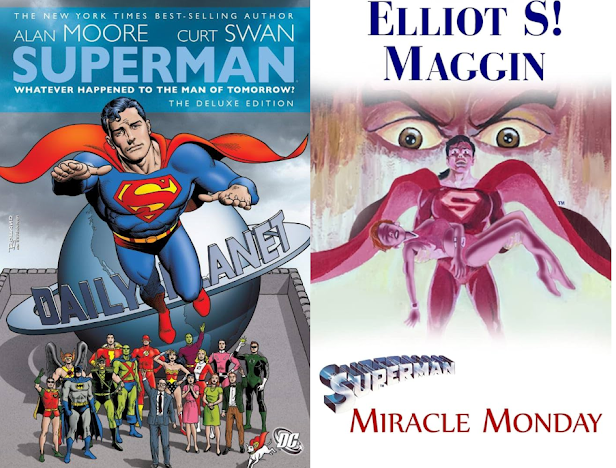






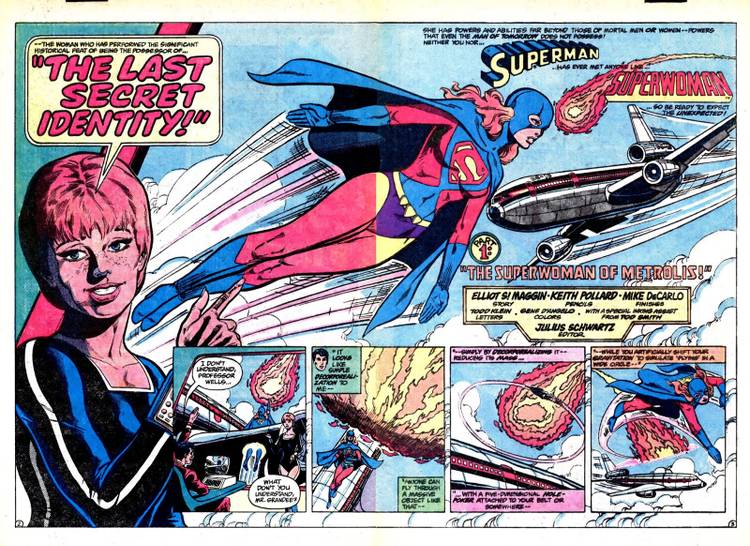
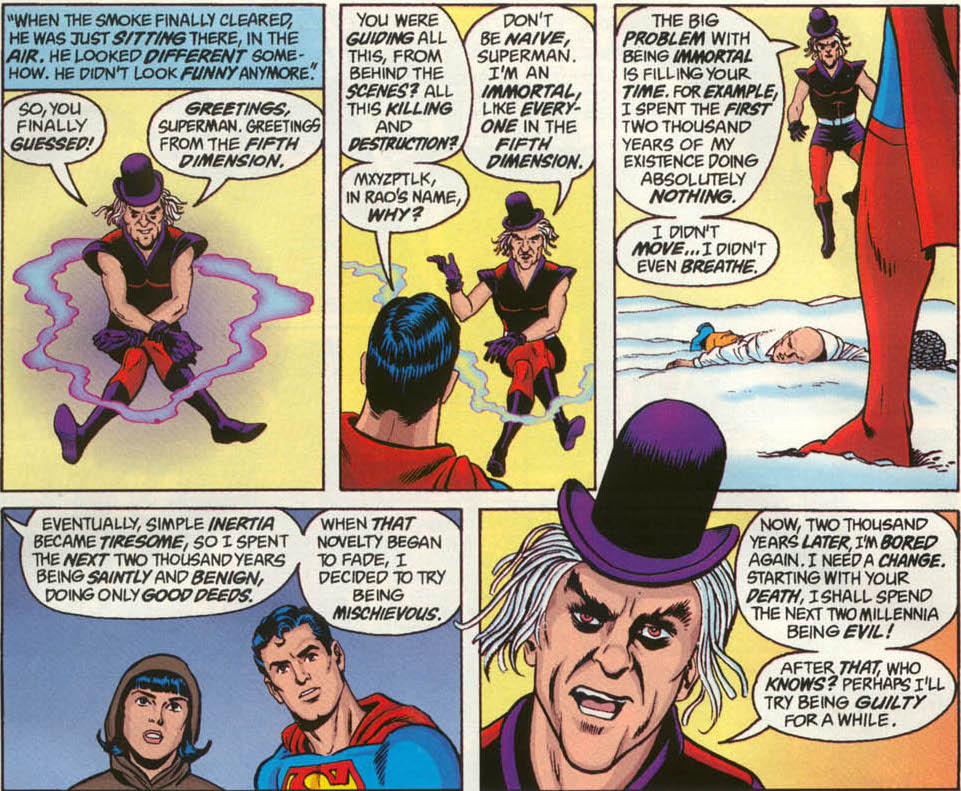


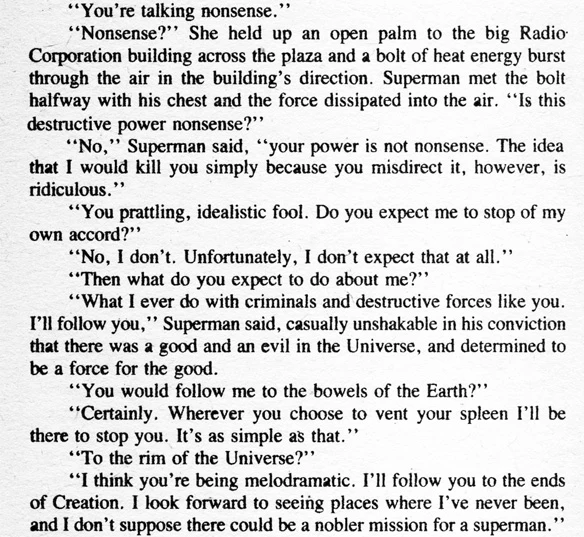

Comments
Post a Comment